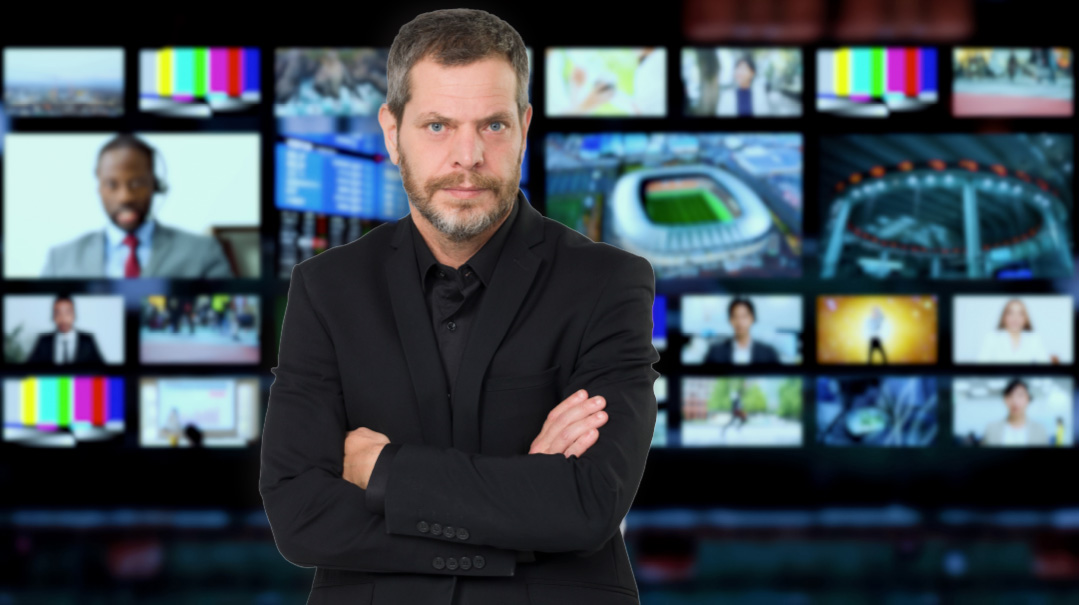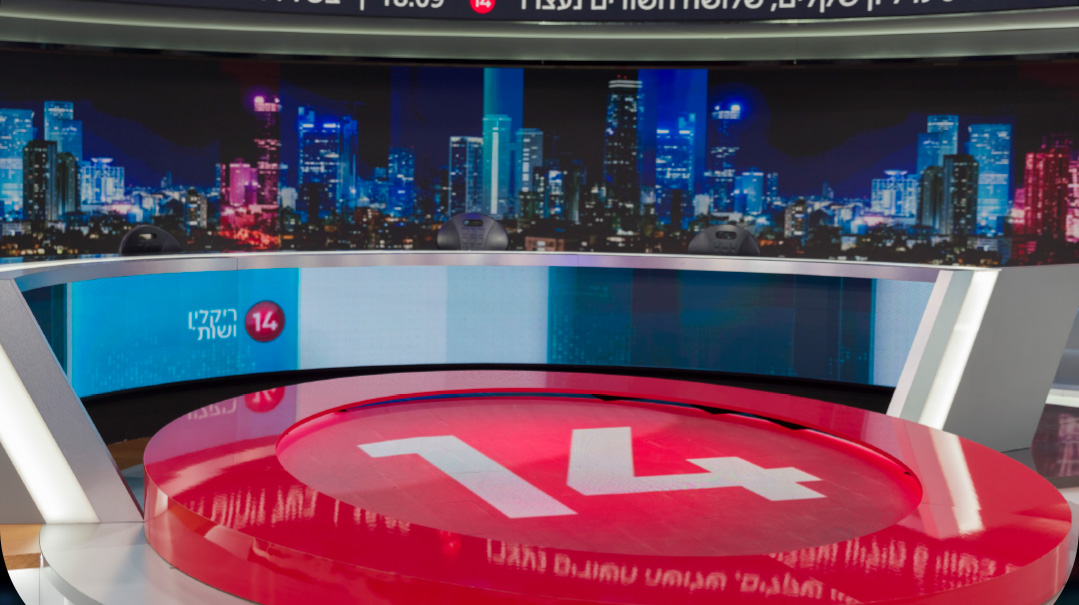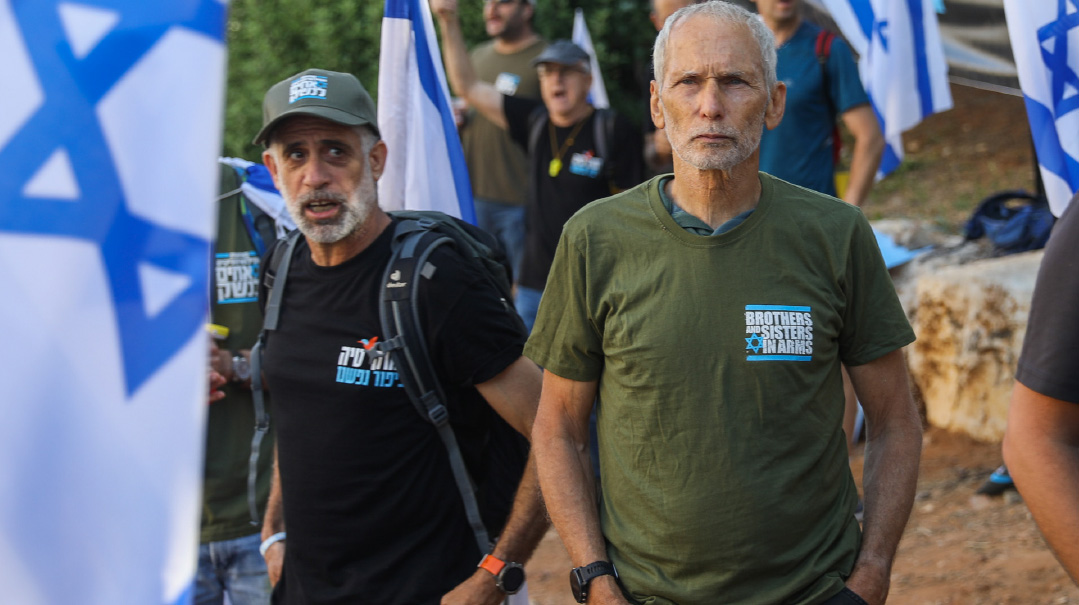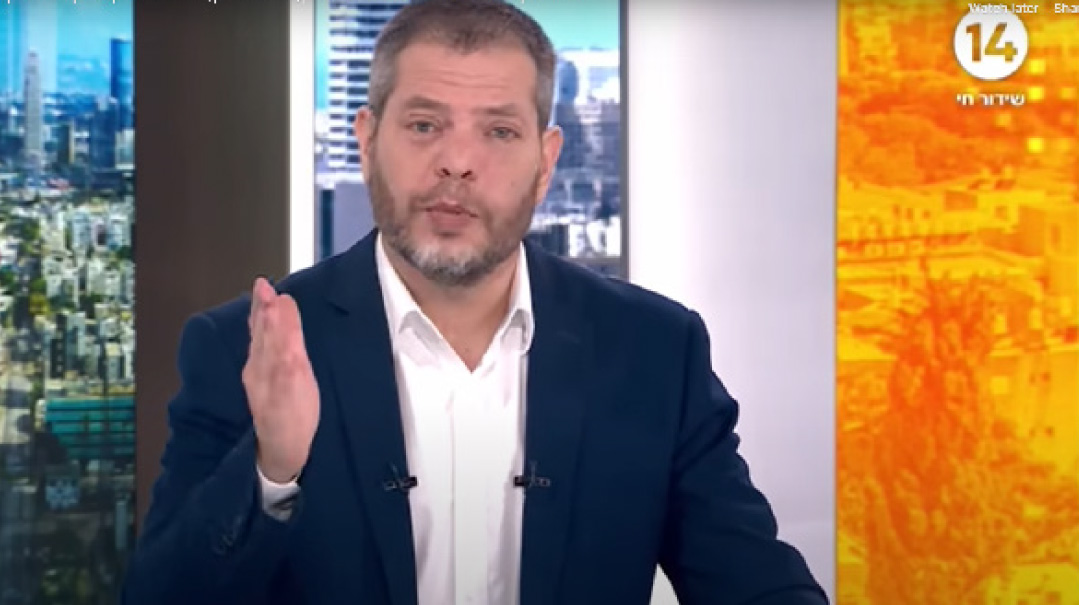Clearing the Air

Shai Golden of Israel’s right-wing Channel 14 is the public face of a growing trend: secular Israelis who’ve grown tired of left-wing propaganda in their news, preferring to align with tradition instead of vilifying it.

“Israel without Judaism and without the chareidim is like a body without a soul. Like an army that has only weapons, but no soldiers. Like a national flag that’s all white,” Shai Golden, television commentator for Israel’s Channel 14, declared last week in an attack on former public security minister and Angel Bakeries chairman Omer Bar Lev, for participating in an anti-chareidi protest outside the home of Ponevezh Rosh Yeshivah Rav Gershon Edelstein.
“Because,” he continued, “if you don’t understand that a straight line runs between the Star of David symbol on our national flag, and our Jewish heritage and Jewish identity, and from there to the chareidim and the yeshivah students and Rav Edelstein, then you don’t understand what Israel is, and you don’t even understand the symbolism of the blue and white flag that you and your friends have taken to wrapping yourselves in with such a sense of ownership.”
A few years ago, no one would have imagined a leading Israeli TV channel broadcasting such a segment – statements like that, if spoken, would be self-censored. But now there’s Channel 14, a relatively new station with a clear right-wing orientation. Originally launched a decade ago as Channel 20, a heritage channel that was not allowed to report the news, with more media privatization it eventually received a news license, and two years ago it was rebranded as “Achshav Arba Esreh” (“Now 14”), with its ratings climbing steadily ever since.
The channel’s Shai Golden is the face of a growing stream of secular rightists who acknowledge the importance of the chareidi community to the State of Israel, and though they lack an appreciation of Torah’s true value as the revealed word of Hashem, they prefer to align with tradition instead of vilifying it. Longtime Likud MK Dudi Amsalem, for example, is known as a stalwart champion of chareidi interests, defending their adherence to tradition, and helping advance draft deferment bills for yeshivah students. He has also fought attempts by progressive heterodox movements to encroach on Israeli religious life.
Amsalem might be motivated by his own strategic political concerns, but he no doubt finds common cause while facing off against the country’s secular Ashkenazi elite. Yet he’s also clearly motivated by a deep love and respect for Jewish tradition.
“We came to Eretz Israel to establish a Jewish state,” he said in the Knesset plenum two years ago. “Democratic, with freedom for everyone, but as a country we have a Jewish character. We are not French, we are not Americans. This is the only country in the world where nationality and religion are the same thing.”
Even current defense minister Yoav Gallant — whom Netanyahu abortively fired for criticizing the pace of the judicial reform — made waves a year ago when he attributed Klal Yisrael’s survival through the millennia to Torah observance.
“The people of Israel survived for 2,000 years thanks to tradition and to praying three times a day in the direction of Jerusalem,” Gallant said at a conference in 2022. “For two millenia, without territory and through a hundred different exiles, we stayed intact. This happened only in the merit of our tradition and submission to a spiritual authority. The Torah and the Mishnah and the Gemara and the tefillos became our anchor in place of the Land of Israel.”
It might seem surreal, but statements like those of Amsalem, Gallant, and Golden have found a willing audience in the growing right-wing secular demographic, which played in important role in electing the largest Israeli right-wing coalition ever. And while these people aren’t necessarily running out to Arachim seminars and becoming baalei teshuvah, it seems they are at least filtering out the leftist incitement against chareidim.
“Now they tell us that Judaism is really democracy and liberal values,” says Shai Golden, a popular public face of this new demographic. “Please, enough with this nonsense. You may not believe in Hashem, or put on tefillin or keep mitzvos — or even be an atheist, but respect history and be honest and admit that if Jews didn’t keep halachic Judaism today, we would no longer exist as a people.”

Channel 14 is quickly gaining traction in the cut-throat arena of ratings and viewers, as media consumers are beginning to tire of being fed leftist propaganda in the guise of news
No Monsters Here
The rebrand of Channel 14 took a hitch on the success of the free daily newspaper Israel Hayom, founded in 2007 by American billionaire Sheldon Adelson. Both Israel Hayom and Channel 14 are eager to cash in on this growing secular audience that is unapologetically right-wing.
Shai Golden, 51, has charted his own winding path. He started out writing for Israel’s Walla news site, then owned by the left-wing Ha’aretz newspaper, and then went on to work for a number of other leading news outlets. About 12 years ago he switched to television, and at the same time began a gradual transition to the right side of the political aisle.
He has also written a number of books, including a biography titled The Good Son, that explored in wrenching detail his childhood as an orphan. He calls his adoptive parents his father and mother, and credits them for instilling in him a respect for tradition.
“My faith comes from home,” he says. “My mother was a believer, but my father lost his faith in the Holocaust. My grandfather, who lived with us for a while until he passed away, was the scion of a family of rabbis from Odessa. And I always had respect.”
His upbringing, however, was anything but religious.
“We had a very secular home,” he says. “We didn’t keep Shabbat or kosher, and like any secular person, I went to synagogue only on Yom Kippur and for my bar mitzvah. But I always respected Judaism and other Jews. I never felt hatred, and I didn’t understand why anyone would. I spent my entire childhood in Ramat Gan. I saw the chareidim, I met them, they didn’t scare me or look like monsters.”
He says that even when he was a so-called leftist, he always spoke in favor of the chareidim and the Torah. “My colleagues just said I was eccentric, and they expected that one day I would see the truth.”
Yet even back in the days when he was entrenched on the left, during the time he held a senior position at Ha’aretz and edited the Ha’aretz supplement, he was the sentry when it came to publishing negative things about the Torah world.

“If you don’t understand that a straight line runs between the Star of David on the flag and our Jewish heritage, then you don’t understand what Israel is.” Shai Golden on anti-chareidi demonstrations and crossing red lines in Bnei Brak
Blame Yourselves
He’s not preaching to the chareidim, because most of them don’t even know who he is, and many have never even heard of Channel 14, where Golden has a very accommodating platform.
The channel, set out to model itself after Fox News, has a clear right-wing orientation, which is quite a shock to the country’s left-leaning public who have always assumed the media has their back. While it’s no secret that secular Israeli media is agenda-driven, that didn’t stop then-interim prime minister Yair Lapid from petitioning the Central Election Commission to declare Channel 14 an “activist body” dedicated to boosting the Likud vote. (The commission rejected Lapid’s petition.)
The station’s most popular program, “Hapatriotim” (“The Patriots”), is a rapid-fire, no-holds-barred roundtable debate among several panelists on politics and current affairs, hosted by former Bayit Yehudi MK Yinon Magal who has a passion for skewering leftist officials.
Israel’s three main TV news stations — Channels 11, 12, and 13 — see Channel 14 as an upstart. It has already surpassed Channel 11 in viewership, and is quickly gaining on 12 and 13.
In fact, Lapid, now demoted to chairman of the Opposition, has been a driving force behind the meteoric rise of Channel 14. As the three traditional channels dropped any pretense of presenting fair and balanced reporting, Israeli right-wing viewers started to reject them and soon discovered “their” channel.
The fact that the channel is clearly right-wing, and that most of its broadcasters openly support Bibi Netanyahu and relentlessly criticize the left and the rest of the media, has only compounded the Israeli left’s animosity for the channel, and many would like nothing more than to see it shut down.
In an op-ed last February, the leftist Ha’aretz complained that “Channel 14’s ratings are climbing steadily, and for more and more Israelis, the concept of a news outlet for which the national leader is always right seems perfectly reasonable. If the trend continues, and there’s no reason to assume it won’t, this will become a lucrative business opportunity, and maybe even Rupert Murdoch will decide to invest here….”
Shai Golden counters that if Israel’s establishment media is unhappy with Channel 14’s success, it has only itself to blame.
“The media plays a significant part in the rift in Israel, and that’s partly because the media is a very superficial medium,” he charges. “The media is preoccupied with superficial messages — good versus bad, black versus white, disaster versus victory. They want good guys and bad guys, and for many, the chareidim are bad guys. And a lot of secular and liberal viewers have been turned into enemies of the chareidim by the media.
“For too long,” he continues, “there’s been a shocking phenomenon of systemic demonization of an entire community, of blaming everything bad and defective in the country on this demographic, as if the chareidim are the problem.”
This tenor, Golden says, was sharpened during the COVID pandemic. “When they decided to single out the chareidim as a danger to public health, I was shocked to the core. This is actually an anti-Semitic motif — there’s no other way to describe it.”
Golden believes that if chareidi faces become more common in media, it will become harder to portray them as an enemy. He believes this change can happen, but it will be a long slog.
“At the moment, Channel 12 and Channel 13 are more similar to Tel Aviv than to broader Israel,” he reflects. “As long as the mainstream media looks like Tel Aviv, it will be harder to bring the chareidim closer. But slowly, on Channel 14, you see more and more men and women and men who look religious, traditional — it has a lot of different faces. At the moment I don’t see the real face of Israel on the screen — all the Israelis on the other channels look the same, and as long as people aren’t shown ‘second Israel’ and ‘third Israel’ and the Arabs and the chareidim. This is the change that the media needs to undergo, and I believe it has begun.”
Golden is proud that his own channel is leading the way in bringing about a sea change in how chareidim, and the entire religious public, is portrayed.
“We give chareidim, plus men with kippot and women with headscarves a lot more screen time,” he says. “Little by little, it will spread to the other channels, and the media will come to more closely resemble the real Israeli society it’s supposed to represent.”

Golden, the new face of the right: “I might be secular, but I still know who I am, what my history is, and how important the Torah is”
Family Ties
Although Shai Golden professes no religious yearnings of his own, after his father passed away last year, a family photo album triggered an important realization.
“I saw that my great-grandfather on my mother’s side and my great-grandfather on my father’s side all looked like the chareidim who live in Bnei Brak, 200 meters from my house,” he says. “And that’s what the great-grandfathers of many other people in this country looked like. There’s a phenomenon in this country of people who are alienated from their identity, at war with their past, in denial about who and what they are.”
Golden would like to hold these family photo albums up as a mirror.
“Whom do you hate? Do you hate your grandfather? Do you hate your great-grandfather? The previous generations as a whole, your roots, your essence — if you’re honest, you’ll realize it’s your past that you hate, not the chareidim.”
Golden dismisses the arguments commonly mustered by anti-chareidi activists, such as serving in the army.
“Let’s break this down,” Golden suggests. “The rate of draft-dodging in Tel Aviv is shocking. We all know very well that there’s no shortage of secular draft dodgers, yet no one raises the issue of ‘shivyon b’netel — sharing the burden’ to the secular public.”
Furthermore, he argues, chareidi contributions to society go beyond Torah learning and preserving Jewish tradition.
“There are also many chareidim who don’t just learn in yeshivah but also volunteer for various charitable organizations and contribute to the state in myriad ways,” he says. “To say that the country’s problem is the chareidim is simply a crime, a scandal, but it comes from something more profound, from a very ancient tendency by some in our people to think that if we’re like the gentiles, then they’ll accept us and leave us alone.”
This tendency originated way back in the time of the Greeks, and is still alive and well in modern Israel. But history has shown, time and again, that assimilation ultimately offers no protection.
“How can you go to war with your heritage? With your identity? With who you are and what you are? When I see the blood of my brothers being spilled, those who are really keeping alive the embers of the Jewish People, I have no choice but to come to their defense.”
Golden mentions this past Independence Day debacle in Tel Aviv. The deputy mayor, Reuven Ladianski, was proud of the fact that the municipality forbade holding gender-segregated festive prayers on Rothschild Boulevard in honor of Independence Day. However, only a week earlier, during the Muslim holiday of Eid al-Fitr, the municipality hosted a completely gender-segregated Muslim prayer event. Golden dedicated one of his televised segments to Ladianski, accusing him of being motivated by hatred of the chareidim (even though it would be the dati-leumi sector, and not the chareidim, who would participate in a Yom Haatzmaut prayer event.)
“So there is a group in Israel that respects all religions: Muslims, Buddhists…. All of them, until it comes to Judaism,” he says. “In the state of the Jews, there are those who are willing to honor everything except Judaism.
Across the Divide
Ultimately, Golden is optimistic about the future. He sees a new willingness on the parts of both the chareidi and secular communities to reach across the religious divide. And while the left-wing secular elite sees an advantage to stoking tensions between the two groups (how else to explain last week’s call for a “siege on Bnei Brak: March of rage against the embezzlers of public funds”?) he sees a rapprochement is taking place between the right-wing secular and chareidi publics.
“We’re seeing a historic development in which chareidi society is extending a hand to secular society, going out of its comfort zone, trying to integrate into the workplace,” he says. “You see many more chareidim in the secular arena, and I feel that there is a deep and genuine effort by chareidi society to take a step toward secular society. And at the same time, there are many, like myself, who are reaching out and saying, ‘We’re brothers.’ The demographic future is chareidi — in 30 years, 30 percent, 40 percent will be Torah families, which is just fine. We’re a Jewish state, and this way we know there will be Jews here. And if we don’t stand together, we’ll fall together.”
(Originally featured in Mishpacha, Issue 962)
Oops! We could not locate your form.







